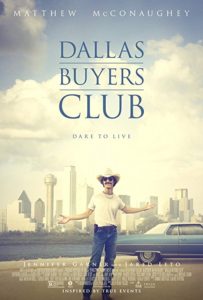My Rating: 7/10
Should I watch it? Yes. The character development is particularly satisfying.

I’m a little late to the hype on this film, as I only watched it a few days ago on Netflix. Going into it, I knew Matthew McConaughey was the go-to for romantic comedy shenanigans, and that Jared Leto was steadily bee-lining for a chance at more serious roles. I wish he hadn’t gone the Suicide Squad Joker route, but that’s a review for a very different day. Either way, I was curious as to why this movie was so praised, and actually hadn’t seen any trailers for it. This is a practice I strive to employ, even though I’m often thwarted by the staggering 30 minutes of trailers that appear before films in theaters these days.
I had no idea the film was about HIV/AIDS, or that there were such things as “Buyers Clubs”. After watching the film, I decided it was an excellent way to learn about it, especially since the film touts that it’s “based on actual events.” I always take this declaration with a grain of salt, especially since casting such prolific actors usually breaks the illusion of reality all too often.
In Dallas Buyers Club, this was not so. I forgot about Matthew’s abs from Magic Mike, and about Jared Leto’s awkward performance in Oliver Stone’s ill-fated Alexander, and was able to believe everything I was watching.
Authenticity
Being from Texas, this wasn’t my first exposure to a class of white male blue-collar workers. Ron Woodroof’s gang of cronies reminded me forcibly of people I’d known and gone to school with, or interacted with on a daily basis. Their racism and misogyny were familiar to me, but this actually didn’t matter. The creed of Ron’s core group is exceptionally clear. We almost immediately know what kind of man he is, and share his devastation when he’s been diagnosed with what he thinks is exclusively a gay man’s disease. It was easy to pass judgment on this group of people, but that’s what makes the movie so interesting-that even though they had strong prejudices and hedonistic lifestyles, it was still important since it was part of who Ron was, and vital to his transformation. Plus, it was actually kind of fun (and also sad, of course) to watch Ron rampage through an incredible amount of drugs and alcohol, unconcerned for his health at all. Exposition delivery : A+
I felt a mix of revulsion and sympathy when Ron is diagnosed, probably because he wasn’t a character I particularly liked, but I didn’t hate him or want him to die. We are somewhat forced to endure his presence, and I had resigned myself to accepting that he would never change his ways, but there was a small hope that was born. McConaughey’s performance is so thoroughly convincing, I actually thought I was watching parts of Ron’s life. I wanted to see how determined he was to survive, and if that determination would help him after the 30 day deadline.
The dialogue was real. The performance of Jared Leto and Matthew McConaughey carry us further inside the sufferings of their characters, and support the flow of the film significantly. All of the spoken lines were not only believable, but delivered so genuinely, part of me wonders if there was any improvisation going on (Probably.).
Rayon and Ron’s Change of Heart

It’s not often that character and actor fuse together so seamlessly to create such a charming and likable entity, but Jared Leto achieved that with Rayon. After his first scene, I realized why he’d won the Oscar (though we can all mostly agree the Oscars are a political game), and I just wanted to see more of him. Like Nathan Lane so many years ago in The Birdcage, I honestly believed that this character was actually a woman, and fell immediately in love with her. Since Rayon considered herself a woman, we’ll be using pronouns like “she” or “her”. It seems inconceivable to use “him/his”, especially since the heartbreaking scene with Rayon in a suit seemed so unnatural. Obviously, that’s a woman, duh. (P.S. – The dialogue in that scene was ruinous in the best way.)
The friendship that irresistibly forms between Ron and Rayon is one that we’re cheering for as it happens. Although I felt some suspicion about Ron’s true intentions, and his callus treatment of Rayon, it becomes evident that he really cares for Rayon’s well-being. He scolds her for not looking after her health, and encourages her to stop taking drugs and eating processed food. Ron actually protects her from the everyday abuse she’s so accustomed to, even going so far to nab his previous best friend in a headlock and force him to shake hands with Rayon.
The little glance Rayon gives him after this exchange is so warming. A few times I got carried away, and thought, “Just KISS already!!!” But perhaps that’s demanding too much change, too quickly. I’m sure there’s a fan fiction out there for it somewhere.

It’s moments like that one, that gradually hint at Ron’s development and change from a hedonistic and prejudiced man, to one who focuses on self-care and becomes irrefutably aware of the sufferings of others. I love character development, but the pacing is vital. If it happens too quickly or too slowly, it doesn’t feel right.
I will say, however, that Ron’s change happens a little too slowly, and it’s so gradual that towards the end of the movie I was asking myself if he was genuinely concerned about people with AIDS, or was he worried about his failing business? I think the intention was that he was invested in the health of his fellow sufferers, of course, but I think I could’ve done with another moment to solidify his alliance. It would have had to be subtle enough not to be obvious, and not too loud to be repetitive.
Trying to think about anything else to discuss, I realized I’d forgotten about Jennifer Garner’s character, Eve the doctor. I thought it was wise of the makeup department not to over-glamorize her, and I think this made her more real. She slipped easily into Eve’s skin as a serious and dedicated physician. Ron’s interaction with her redeems his character for us, as all of his interactions with women in this film are sexual or objectifying. His dinner with Eve and his hiring of a black assistant to run his business are visual cues displaying his growth.
Conclusion
This film was really well-made. The writing, performances, and editing was seamless, and easy to watch. I don’t mean to say the subject matter is lighthearted, but this was a rich peek into a world I wouldn’t have otherwise known about.
I’m not sure what the true history behind this story is, and I don’t think it’d be relevant to discuss it. I really enjoy movies adapted from real-life stories, but I think it’s really dependent on the filmmaker, and what they would like to prioritize. Do they choose to tell the story as accurately as possible, or do they want to create a more dynamic story? I think we’ve learned how much it varies from the many adaptations we’ve seen. We’ve found that adaptations aren’t always faithful, and sometimes fail, or they’re exceptionally faithful, and fail. At the end of the day, I think the most important thing is to tell a good story. Sometimes that means leaving things out, or adding things in (within reason).
Dallas Buyers Club nailed the message they were trying to send. It brought attention to a subject that was taboo and uncomfortable to discuss for so long, which is an example of how film can perpetuate emotional awareness and empathy. Good stuff.
Success? Most definitely.
Cry Count: 0